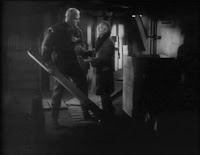So, as we’re getting into the season of all things eerie and mysterious, I thought I’d babble on about a little problem I’ve seen once or thrice. The nice thing about it is, like many things, it’s pretty easy to avoid once you notice it.
Just like you can have false drama, it’s also possible to have false mysteries. These stories are boring and frustrating more than interesting. I’ve come across them a lot in genre stories and scripts, and once or thrice in political thrillers.
A quick recap…
A mystery is when the main character(or characters) and the audience are aware that an important fact has been hidden from them, and the story usually involves the search for that unknown fact. Who killed Mr. Boddy? What room did they kill him in? What did they use to do the deed? And why does that reanimated mummy want that old Egyptian coin? At it’s simplest, a mystery is a question someone in your story is asking and trying to find the answer to.
In a good mystery the answers always exist. There are people to ask, clues to examine, deductions to make, and so forth. There’s always someone who knows the answer. It might be the murderer, a cult member, the retired beat cop, anyone. But someone has the answers the characters–and by extension, the readers– are looking for.
Now, here’s where some folks go wrong.
In an attempt to make their main character seem skilled or clever, I’ve seen many fledgling writers solve the mystery in the opening pages of their story. The solution is revealed to the main character right up front and then the rest of the narrative becomes all about keeping this information from the audience. The mystery’s solved, the answer just isn’t being given out until the end.
For example, I read one book recently that was a take on the Grail myth. Two parallel characters– one during the Crusades, the other in modern times– are on quests to find the secret of the Holy Grail. However, the first character gets taken aside by her father less than 1/5 into the book and–I kid you not–it essentially goes like this…
***
“Come, daughter. I must tell you a story.”
He talked long into the night and into the morning. His mouth went dry several times. As the sun broke over the hills, he finished.
“This is amazing,” she finally said. “You’ve known this all along?”
“Yes, and now you must keep this fantastic secret, too, until you pass it on to your child.”
***
I’m not exaggerating. That’s almost word for word what the author has on the page.
So, the story then covers another 300 pages during which Phoebe (not her real name) risks the lives of her friends and makes seemingly-irrational decisions to protect a secret she’s really just hiding from the readers. In the end, we don’t even get the answer from Phoebe. The author abandons the whole Crusades-era thread with Phoebe cornered by her enemies and just has someone else tell the modern-era character what happened to her. “Ah, the story of Phoebe? A sad tale, really. You see, when she was cornered by her enemies she…”
That was it. One person has the answers for the whole story, dies “off camera,” and someone else just walks in to read the answer out of a book. No, seriously. The modern character finds this historian and he actually reads her the answer out of a book.
 This is not a mystery. Sure you can pitch it as the mystery of the grail, but it’s not. It’s just withheld information. A successful mystery has certain key elements which I’ve mentioned before. The reason this sort of story structure fails is that it violates two of these minimum requirements.
This is not a mystery. Sure you can pitch it as the mystery of the grail, but it’s not. It’s just withheld information. A successful mystery has certain key elements which I’ve mentioned before. The reason this sort of story structure fails is that it violates two of these minimum requirements.
The first of these is that a mystery needs to have a resolution. The characters are searching for that hidden piece of information and they must find it for the mystery to work. The problem here is that the answer was found early in the story. So… mystery solved. In the example above, we were searching for the secret of the Grail and found it on page 81. The rest of the story is unnecessary.
The second element is that in a good mystery we like the protagonists and can relate to them. In any good piece of storytelling–whatever the genre–the characters should mirror the audience. It’s important to them that the answer is found, thus it’s important to us that the answer is found. We want to stick with them until they find those solutions and resolve things.
Y’see, Timmy, the main character can’t be the person holding the answers. In order to do that, they have to hide those facts from the reader (like Phoebe did). Now Phoebe isn’t mirroring the audience, she’s keeping them at arm’s length. The moment she starts concealing things, our protagonist has just alienated the reader.
For the record, this also holds for any Mr. X/ femme fatale type characters who make vague statements or drop cryptic hints. If they’re only here for a page or two, great. But these people can’t be following the main character around for two hundred pages or else they become protagonists, too. And, as I just mentioned above, they’ll be protagonists we don’t like.
If you want to put a mystery in your story, that’s great. Mysteries rock and great mysteries get remembered forever. Just make sure it’s a real mystery, with all the necessary elements it needs to work.
Next time, it being the season and all, I’d like to talk with you about horror.
Until then, go write.



